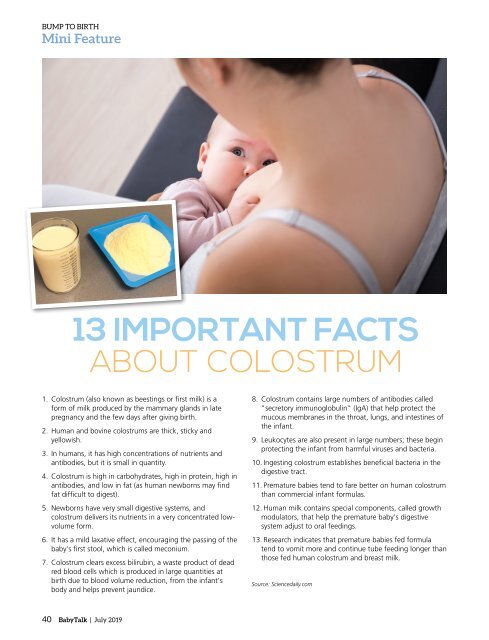You also want an ePaper? Increase the reach of your titles
YUMPU automatically turns print PDFs into web optimized ePapers that Google loves.
Bump To Birth<br />
Mini Feature<br />
13 important facts<br />
about Colostrum<br />
1. Colostrum (also known as beestings or first milk) is a<br />
form of milk produced by the mammary glands in late<br />
pregnancy and the few days after giving birth.<br />
2. Human and bovine colostrums are thick, sticky and<br />
yellowish.<br />
3. In humans, it has high concentrations of nutrients and<br />
antibodies, but it is small in quantity.<br />
4. Colostrum is high in carbohydrates, high in protein, high in<br />
antibodies, and low in fat (as human newborns may find<br />
fat difficult to digest).<br />
5. Newborns have very small digestive systems, and<br />
colostrum delivers its nutrients in a very concentrated lowvolume<br />
form.<br />
6. It has a mild laxative effect, encouraging the passing of the<br />
baby's first stool, which is called meconium.<br />
7. Colostrum clears excess bilirubin, a waste product of dead<br />
red blood cells which is produced in large quantities at<br />
birth due to blood volume reduction, from the infant's<br />
body and helps prevent jaundice.<br />
8. Colostrum contains large numbers of antibodies called<br />
"secretory immunoglobulin" (IgA) that help protect the<br />
mucous membranes in the throat, lungs, and intestines of<br />
the infant.<br />
9. Leukocytes are also present in large numbers; these begin<br />
protecting the infant from harmful viruses and bacteria.<br />
10. Ingesting colostrum establishes beneficial bacteria in the<br />
digestive tract.<br />
11. Premature babies tend to fare better on human colostrum<br />
than commercial infant formulas.<br />
12. Human milk contains special components, called growth<br />
modulators, that help the premature baby's digestive<br />
system adjust to oral feedings.<br />
13. Research indicates that premature babies fed formula<br />
tend to vomit more and continue tube feeding longer than<br />
those fed human colostrum and breast milk.<br />
Source: Sciencedaily.com<br />
40 BabyTalk | <strong>July</strong> <strong>2019</strong>

















